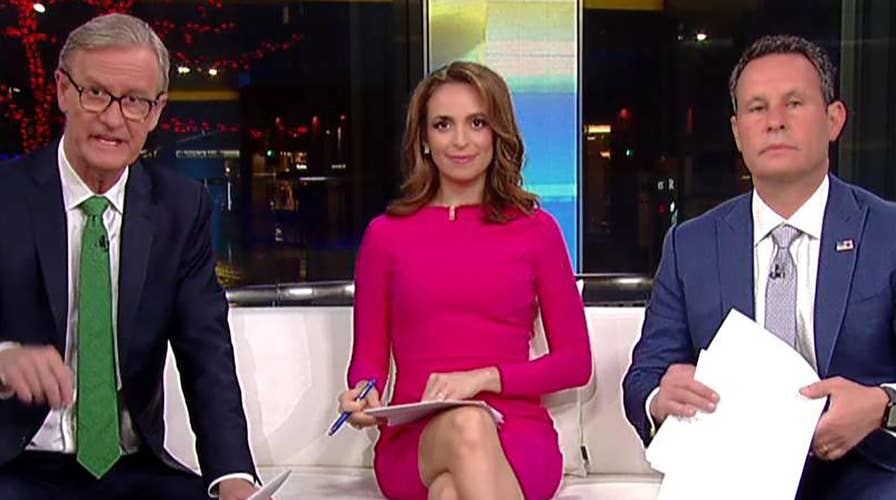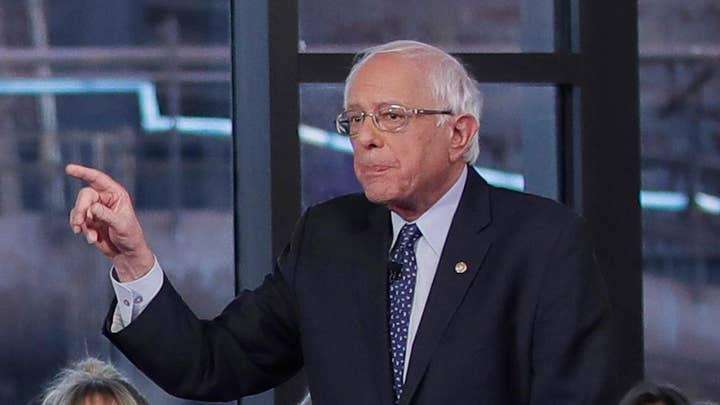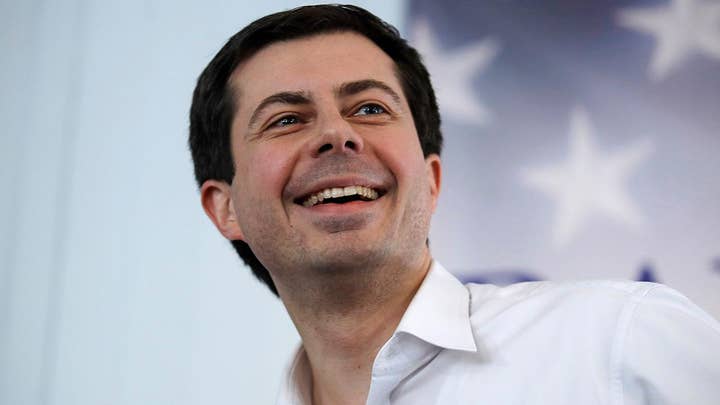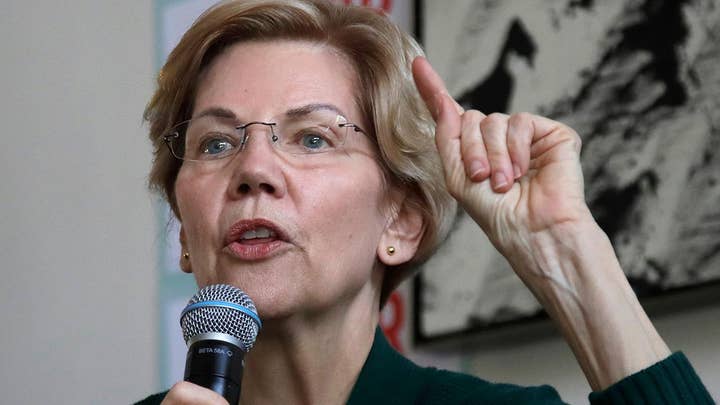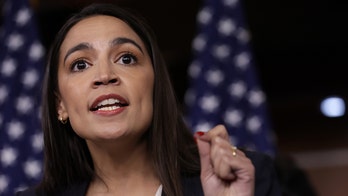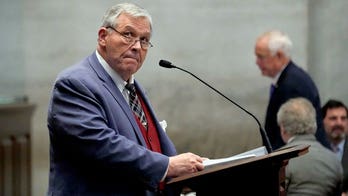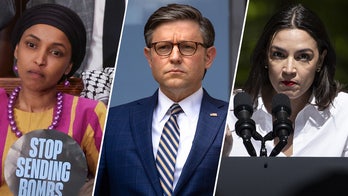President Donald Trump enjoys a humongous financial head start over his Democratic challengers as the 2020 election cycle heats up, after hauling in more than $30 million in fundraising in the first three months of this year.
Sen. Bernie Sanders of Vermont – one of the co-frontrunners in the 2020 Democratic presidential nomination polls – holds a large lead over his rivals when it comes to the cash his campaign has on hand. Presidential candidates must report to the Federal Election Commission by the end of Monday how much money they raised and spent in the first quarter of 2019.
TRUMP HAULS IN $30 MILLION IN FIRST THREE MONTHS OF 2019
Trump’s re-election campaign brought in $30.3 million in the January-March first quarter of fundraising, and reports having $40.8 million cash on hand. The Republican National Committee, which will be backing the president’s re-election, raised an additional $45.8 million in the first three months of the year, a record for the party in a non-election year. Combined, the party and Trump's two re-election committees can boast having $82 million in the bank, a massive war chest so early in a presidential election cycle.
“The President is in a vastly stronger position at this point than any previous incumbent president running for re-election, and only continues to build momentum,” said Trump re-election campaign manager Brad Parscale.
2020 CANDIDATES' 1ST-QUARTER FUNDRAISING: BY THE NUMBERS
Breaking with generations of precedent, the president filed his campaign paperwork to run for re-election on the day he took over in the White House, and has raised more than $127 million during his first two years in the Oval Office.
It’s a dramatic change from his 2016 campaign, a low budget affair compared to Democratic presidential nominee Hillary Clinton. Trump ended up self-financing much of his campaign, putting $66 million of his own money into his White House bid.
TRUMP BLASTS PELOSI OVER OMAR 9/11 COMMENTS
And Trump’s setting up his re-election bid immediately after assuming the presidency stands in stark contrast to his two immediate two-term successors.
President Barack Obama didn’t declare his candidacy for re-election until April of 2011, and had only $2 million cash on hand at that time. And President George W. Bush raised less than $270,000 during his first two years in office, ahead of his 2004 re-election.
The Trump campaign touted its small-dollar grassroots appeal, announcing that 98.79 percent of first-quarter contributions were $200 or less, and that the average donation to the campaign was $34.26.
Among the Democrats, Sanders is on top when it comes to the amount of cash raised and the amount of money in the bank. The Independent from Vermont, who’s making his second straight bid for the Democratic presidential nomination, reported raising $18.2 million, with $28 million cash on hand, having transferred money left over from his 2018 Senate re-election bid.
Sen. Kamala Harris of California reported raising $12 million. So did former Rep. John Delaney of Maryland, who’s considered a long-shot for the nomination. But $11.7 million of that haul was an infusion of cash from the candidate, who’s a self-made multi-millionaire.
Former Rep. Beto O’Rourke of Texas raised an eye-popping $9.4 million during the first 18 days of his campaign, with $6.1 million of the haul coming in the first 24 hours after declaring his candidacy.
When Pete Buttigieg announced earlier this month that he had brought in nearly $7.1 million during the first quarter, it was another sign that 37-year old South Bend, Indiana mayor had moved from a long-shot status to one of the leading contenders for the Democratic nomination. In Monday’s filing with the FEC, his campaign revealed that it had $6.4 million cash on-hand as of April 1, indicating he’s been frugal with his resources.
But his burn rate may increase going forward, as Buttigieg, over the past two weeks, has doubled his campaign staff from 20 to 40, moved into a larger headquarters, and now is in the process of staffing up in the early voting primary and caucus states.
Buttigieg’s campaign also touted that it raised $1 million in just a few hours on Sunday after the candidate formally declared he was running for president.
Among those celebrities who contributed to Buttigieg during the first quarter – actors Jayne Lynch, Mandy Moore, Ryan Reynolds and entertainer Chelsea Handler.
Sen. Elizabeth Warren raised $6 million in the first quarter. The Massachusetts Democrat, who’s stressing fighting corruption and big money in politics, announced in late February that she was forgoing "fancy receptions or big money fundraisers only with people who can write big checks," as well as phone calls with wealthy donors. The senator had $11.2 million in the bank, thanks to a large transfer of funds from her 2018 re-election campaign.
Sen. Amy Klobuchar of Minnesota raised $5.2 million from her campaign launching during a snowstorm in February until the end of the first quarter. She had $7 million cash on hand as of April 1, thanks to a transfer of cash from her 2018 re-election campaign.
Sen. Kirsten Gillibrand of New York raised only $3 million in the first quarter, but thanks to a transfer of funds from her 2018 re-election bid, she had $10.2 million in the bank for her presidential campaign. And Sen. Cory Booker of New Jersey brought in $5 million in his first two months as a presidential candidate, and as of April 1 had $6.1 million cash on hand.
Washington State Gov. Jay Inslee brought in $2.25 million since launching his campaign last month. Former Colorado Gov. John Hickenlooper raised $2 million in his first four weeks as a candidate, with $1.33 million cash on hand.
Businessman and entrepreneur Andrew Yang raised $1.5 million; bestselling spiritual author Marianne Williamson brought in $1.5 million; and former San Antonio, Texas, mayor and former Housing and Urban Development Secretary Julian Castro raised $1.1 million.
Fundraising is considered an important barometer of a candidate's popularity and a campaign's strength. The cash can be used by a candidate to build an organization and hire staff and consultants, increase voter outreach efforts, travel and fund ads.
CLICK HERE TO GET THE FOX NEWS APP
Democratic strategist Jesse Ferguson, a presidential campaign veteran, highlighted that the numbers are an important “data point to show us how campaigns are doing.”
“The numbers will surely be over-interpreted, but they will tell us who is building the base of support needed in order to stay in for the long haul,” explained Ferguson, who served as a senior spokesman on the 2016 Clinton presidential campaign.
